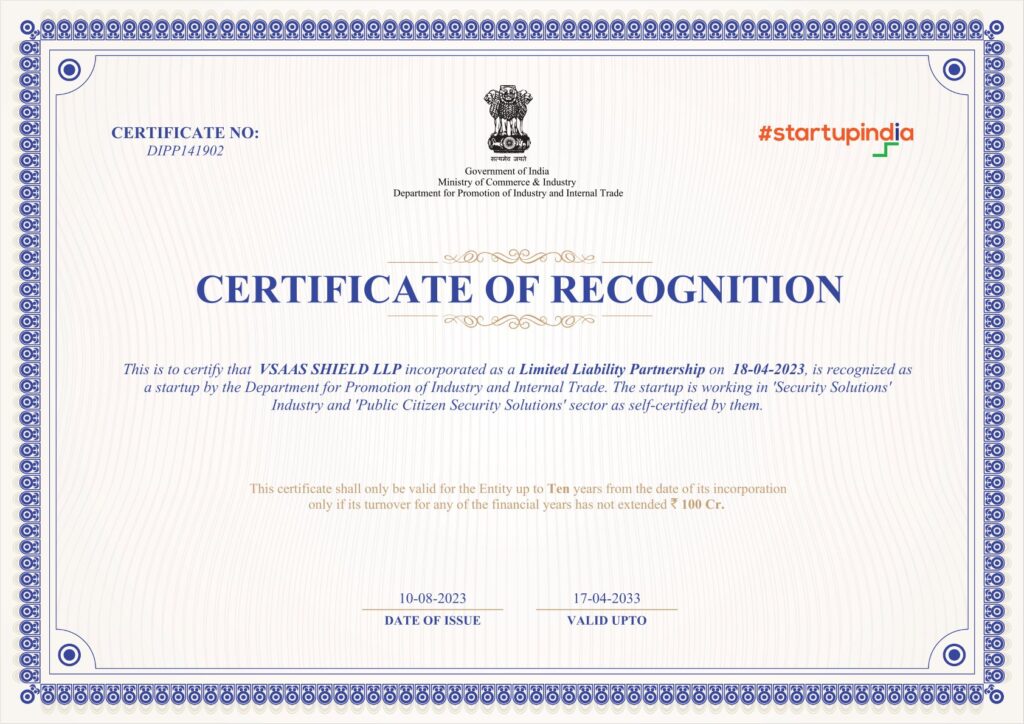Startup India Registration

According to the revised announcement that was published on 23rd May 2017, an organization will be considered a Startup: if it is incorporated in India as a private limited company (as defined in the Companies Act, 2013) or registered as a partnership corporation (registered under section 59 of the Partnership Act, 1932) or a limited liability partnership (under the Limited Liability Partnership Act, 2008); and for ten years from the date of its incorporation/ registration; in any case, on account of Startups in the biotechnology division, the period will be as long as 10 years from the date of its incorporation/ registration; and if its annual turnover for any of the financial years since incorporation/ registration has not surpassed Rs. 100 crores; and if that it is working in the direction of innovation, development or improvement of items or procedures or services, or if that it is a scalable business model with a high capability of employment generation or wealth creation. An organization created by splitting up or reconstruction of existing commerce will not be considered a ‘Startup‘.
Also, a Startup should not more than 10 years old for startup recognition or not be incorporated before April 2016 to claim a Tax Exemption certificate
Benefits of the Startup India Scheme
Startup India Scheme – Startup India Scheme is an initiative of the Government of India, and the benefit of the Startup India Scheme is the promotion of startups, generation of employment, and wealth creation. It was established on the 16th of January, 2016 by Prime Minister Narendra Modi.
Also under the Startup India Scheme, one more benefit of the startup India scheme is that eligible organizations could get recognized as Startups by DPIIT, so as to access a host of tax benefits, easier compliance, IPR fast-tracking, and many more.
Benefits of Startup Business
The Modi government highlights the accomplishment of monetary goals as one of the centers focuses on the administration. The governance for the betterment intends towards promoting employment creation, foreign investment, development of skills, and entrepreneurship. So as to culminate every one of these benefits, the Startup India Action Plan was launched.
Startups are entitled to a number of benefits, where a portion of these benefits are administrative and tax benefits, capital gains exception, as well as government help for startup funding. Also along with tax benefits, startups would likewise also enjoy the help of a self-certification compliance framework with regard to labor and environmental laws. This implies the startup’s businesses would be excluded from any inspections of the place of business for up to 3-5 years.
Some other major benefits that the startup’s businesses in India shall be qualified for incorporate an 80% reduction in patent registration fees and a 50% reduction in trademark filing. Startups businesses would likewise be benefited from free-of-cost legal help in conjunction with simplified entry and exit norms and protection of Intellectual Property Rights (IPR).
Advantages of Startup India Registration
The advantages of Startup India are:
• Startups shall be allowed to self-certify compliance with 6 Labour Laws and 3 Environmental Laws through a simple online process.
• For labor laws, no inspections shall be carried out for a period of 5 years. Startups might be inspected only upon receiving of reliable and confirmable grievance of infringement that is filed in writing as well as accepted through at least one level senior towards the inspecting officer.
• For environment laws, the startups that come under the white category would be able to self-certify compliance, as well as only random checks, would be carried out in such matters.
Benefits of being a startup
Prime Minister Narendra Modi has started and promoted Startup India.
The startup businesses are liable for many benefits for establishing start-ups, they are:
• The Indian Government has launched a mobile application as well as a website for easy registration for startups. For incorporating a startup, an individual is required to fill up a simple form online on the website and upload certain documents.
• Government of India also offers lists of facilitators for filing patents as well as trademarks at lower fees.
• An Rs. 10,000 crore fund has been set up by the government to give finances to the startups as venture capital. The government is in addition providing guarantees to the lenders to persuade banks and other financial institutions for giving venture capital.
• Also, Startups are exempted from income tax for 3 years provided they obtain a certification from the Inter-Ministerial Board (IMB).
• Startups could apply for government tenders and are exempted from the “prior experience/turnover” criterion applicable for regular firms answering to government tenders.
• Seven new Research Parks shall be set up to give facilities to startups in the R&D sector.
• Many of the compliances were simplified for startups to save time and money.
• Individuals investing their capital gains in the venture funds set up by the government would be an exemption from capital gains. This is going to help startups to attract more investors.
• The startups have the option to choose between the VCs, and they have the liberty to choose their investors.
• A startup could close its business within 90 days from the date of application of winding up.
• The government would be holding 2 startup fests annually both nationally and internationally for allowing various stakeholders of a startup to meet.
Benefits of the Startup India scheme
The benefits of the Startup India Scheme are financial support, Government tenders, networking opportunities, etc. Startup India has been launched by Prime Minister Shri. Narendra Modi on January 16, 2016
The benefits of the startup India scheme are:
• Financial Benefits.
• Income Tax Benefits.
• Registration Benefits.
• Government Tenders.
• Huge Networking Opportunities.
1. Financial Benefits
The majority of the startups are patent-based. It implies they produce or provide exceptional products or services. So as to register their patents, they need to incur a heavy cost, which is recognized as the Patent cost. Under this scheme, the government provides an 80% reduction in patent costs. In addition, the procedure for patent registration and related matters is quicker for them. Likewise, the government pays the fees of the facilitator towards obtaining the patent.
2. Income Tax Benefits
The startup has a lot of benefits under the Income Tax Act. After getting recognition, a Startup can apply for Tax exemption under Section 80 IAC of the Income Tax Act. After getting clearance for Tax exemption, the Startup could avail of tax holidays for 3 consecutive financial years out of its first ten years since incorporation. After getting recognition, a Startup might apply for tax- exemption under Section 56 of the Income Tax Act (Angel Tax).
Special Benefits
• Manufacturing business startups are exempt from the criteria of ‘prior experience’ or turnover. However, there is no relaxation in the quality standards or the technical parameters regarding public procurement.
• National Credit Guarantee Trust Company, or SIDBI, ensures guaranteed funds for over 4 years.
• Labor law inspections shall not be carried out in the first 3 years of incorporation.
• Environmental law compliance is only compulsory after self-certification.
• Winding up of the corporation could be completed in just under 90 days under the Insolvency and Bankruptcy Code.
3. Registration Benefits
Under the Startup India scheme, an application is there to make registration easy. A single meeting is arranged for the Start-up India hub. Also, there is a single doubt and problem-solving window for them.
4. Government Tenders
Under the Startup India scheme, startups have the benefit of participating in public procurement jobs by means of government tenders. Also, there is relaxation in prior experience, EMD, or turnover criteria.
5. Huge Networking Opportunities
Networking opportunities imply the opportunity to meet with a variety of startup stakeholders at a specific place and time. The government gives this opportunity by conducting 2 startup festivals annually nationally and international level allowing various stakeholders of a startup to meet. The Startup India scheme also offers Intellectual Property awareness workshops as well as attentiveness.
Eligibility for Registration of Startup India
Private Limited Company/LLP/Partnership Firm
company is offering Innovative products or services
Registered for not more than 10 years
The company has a business model with a high potential for employment enervation.
Turnover does not exceed Rs. 100 crore.
The company has a business model with a high potential for wealth creation
Registration Process for Startup India
There are many steps for registration of Startup India, which are given below:
1. Incorporate your business
First, you need to incorporate your business into a Private Limited Company or LLP firm. You just follow the normal procedure, which involves filing a form, to get the registration.
2. Register under Startup India
After that, you need to register the company or firm under the startup India scheme of the Indian government. You fill in all the details in the form, which is available on the website of Startup India and then upload some documents as well.
3. Documents you need to upload in PDF format only
You need a registration form along with the recommendation letter. You can get anyone’s recommendation letter, which is mentioned below:
A recommendation letter from any post-graduate college in India or in a format that is approved by the DIPP. OR
A recommendation letter from an incubator that the Government of India funds as a part of any specified scheme to promote innovation; OR
A letter of funding not less than 20% in equity by an incubator fund, private equity fund, angel fund, accelerator fund, or Private Equity fund that is registered with SEBI and that counters the innovative nature of the business; OR
A recommendation later by the Central Government or any State Government of India; OR
Registration or Incorporation Certificate.
You need to upload the certificate of incorporation of your company or LLP or a registration certificate for a partnership company and provide a brief description of your business.
4. If you need tax exemption, mention it
Startups do not have to pay income tax for the first three years in India but can avail of some benefits when the company is certified by the Inter-Ministerial Board. This is where the company registered with DIPP gets relaxation, as the registration is enough to get the benefits.
5. Self-certification of the following conditions
Your company is a Private limited company an LLP or a partnership firm.
In India, your business must be incorporated or registered not before 5 years.
Your company’s turnover must not be more than Rs. 100 crore.
Your business must be a fresh idea, not a breakdown or reconstruction of an existing business.
6. Get your recognition number
For the registration of the application, you will get a recognition number with immediate effect. After the authority goes through all your uploaded documents, you get the certificate of registration or incorporation only.
Now enroll your company in the Startup India scheme and reap all the benefits that are provided by the government.
Documents required at the time of Startup India Registration process:
- Registration Certificate
It is essential for you to upload the certificate of incorporation of your company/LLP (Registration Certificate in case of partnership)
- Email ID and mobile number, including contact details
- Company details, which shall include the Industry, Sector of work, category of dealing, registered Office address, etc.
- Evidence of concept like pitch deck, video, website link in case of early traction and validation.
- The details about the Directors or Partners involved with the company, which shall include their Name, Photo ID, Gender, Contact number, Email ID, and address,
- The details of the authorised representatives ( Name, contact details, Designation, Email ID)
- Revenue model and Uniqueness of the Product.
- PAN details
- A Brief Description Of Business
Provide a quick description of the innovative nature of your business.
Eligibility for Startup India Registration
- The organization to be framed must be a private limited organization or a limited liability partnership.
- The enterprise has not completed a period of ten years from the date of incorporation or from the registration date.
- The enterprise did not have a turnover exceeding 100 crore annually for any of the financial years since its incorporation.
- The enterprise should be working towards the development, innovation, or improvement of the services or processes with the purpose to generate employment or create wealth.
- The most important eligibility condition is that the Startup enterprise must not form by reconstructing or splitting up any business which is already in existence.
- The organizations ought to have gotten the approval from the Department of Industrial Policy and Promotion (DIPP).
- In order to get approval from DIPP, the firm ought to be supported by an Incubation fund, Angel Fund or Private Equity Fund.
- The firm ought to have gotten a supporter guarantee from the Indian patent and Trademark Office.
- It must have a proposal letter by incubation.
- Capital increase is excluded from income tax under the startup India scheme.
- The firm should give innovative ideas, products or services.
- Angel fund, Incubation fund, Accelerators, Private Equity Fund, Angel network should be registered under SEBI ( Securities and Exchange Board of India).
- Registration Certificate

